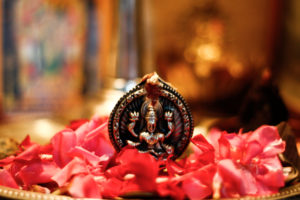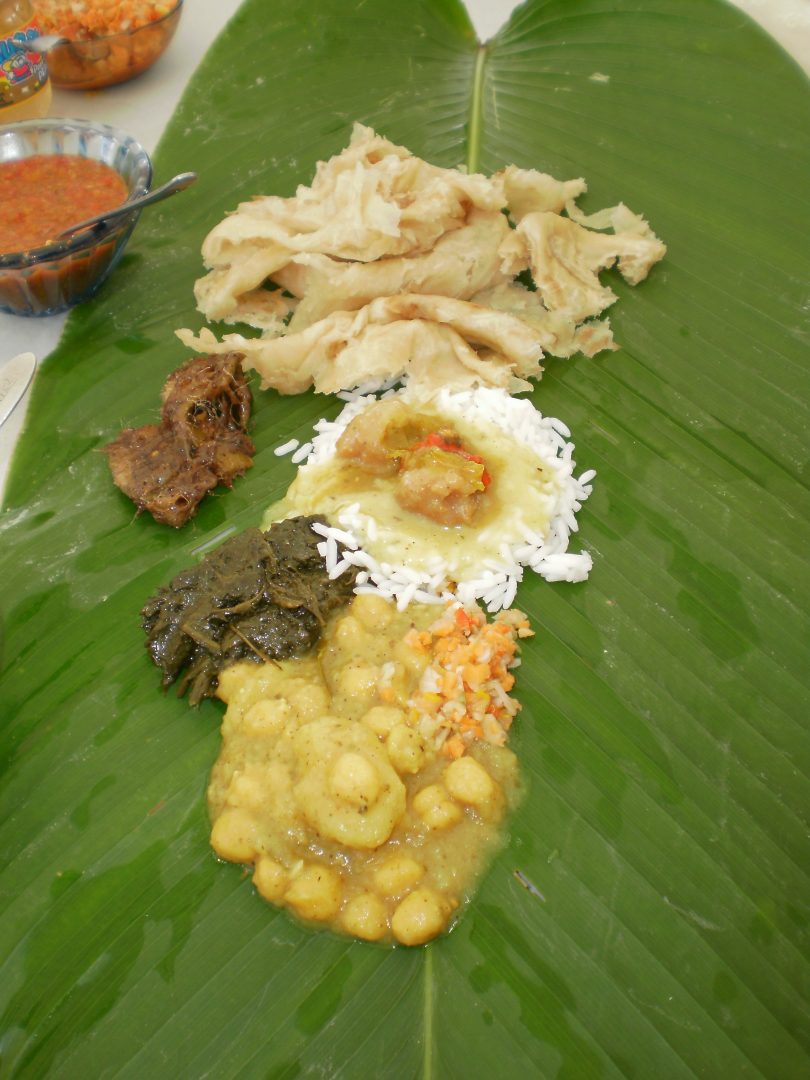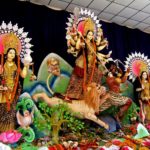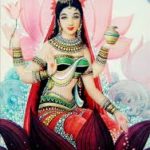“HERE every creed and race find an equal place…” the second to the last line of our national anthem is proven once again by the festival of lights.
Divali, in Trinidad and Tobago, is celebrated annually but not on the same date; as that is determined by Pundits (a Hindu Priest) then placed into the Hindu calendar.
Mother Lakshmi is the Hindu goddess of wealth and prosperity. On Divali, Hindus believe that she visits every home; so they stay at home to welcome her. They offer her a jowl (a cup-like dish) with flowers and milk/water.
The Food
They prepare meals (without meat or flesh) such as curried potatoes (alu) and channa, curried chatine, curried mangoes and stewed pumkin to be eaten with ‘buss up shot’ roti( which is similar to bread but its flaky like texture means it cannot a proper sandwich so it is dipped by hand into its sides (talcaree) or rice with currhie.
 Parasad (a Hindu treat made with fruits, flour and raisins, is also offered to the gods and Goddesses or blessed on that day; then it is given to the household to eat. More is shared amongst relatives and friends.
Parasad (a Hindu treat made with fruits, flour and raisins, is also offered to the gods and Goddesses or blessed on that day; then it is given to the household to eat. More is shared amongst relatives and friends.
Mf
2. Hindus believe that Mother Lakshmi comes to them in all forms; even as a beggar so no one is turned away on that day. Everyone who visits the home is treated with kindness and respect.
Non-Hindus are invited to Hindu homes for lunch and even partake in Hindu related events, like, lighting the Dyas (a small clay bowl that is filled with coconut oil; a wick is placed into the oil then lit). The Dyas are lit after evening prayer and must be the first light to be lit in the Hindu home on that day.
Villagers use bamboo joints to place Dyas.
The bamboo joints are formatted into lots of different patterns for decoration purposes. It’s fun to partake in such activities which bring villagers together.
We Trinidadians may like Divali but our pet dogs don’t… especially when those young boys ‘burst bamboo’. Young boys take the large empty bamboo stems, light a flame at the back of it then blow through the flame into the stem; which makes a very loud explosive sound.
It doesn’t bother people much but our dogs are terrified; these poor animals become so frantic that some of them end up missing or die from heart attacks (the old ones).
Mf
3. Non Hindus partake in Divali celebrations even if they weren’t invited to a Hindu home by having ‘buss upshot’ roti and curried sides for lunch, lighting up their homes by using small string light bulbs and ‘leaving it up for Christmas one time’ as we ‘Trini’ folk say (Divali is usually close to Christmas every year).
Divali in Trinidad and Tobago is a joyous time for all nationals, not just Hindus. Non-Hindus still get a day off school or work, to eat Roti and Parasad, to see all the pretty Dyas lit in formations, to take advantage of Divali sales at most Supermarkets and furniture stores and last but not least, to support our Hindu brothers and sisters and thank them for their wonderful contribution to our rainbow country.
A Hindu member (name N/A) added, “Divali is a very important holiday. It is a day when Hindus give thanks for what they have and pray for peace, pray to always be humble and contented and to always have patience. To always remember that no one can take what is given to you by God.
It is a day to welcome Mother Lakshmi into their home with open arms in whatever form she may portray. It is a day to enjoy with their family and friends and Mother Lakshmi of course”.
Melva Burnley, a housewife in a small village is not a member of the Hindu faith. She added ” I have nothing against Hindus, I am not one but I respect them all the same. On
4. Divali, I do cook meh Roti and light up. In d evening we do take a drive around the neighborhood and watch d Dyas”. She also mentioned taking advantage of Divali sales… I guess we all do.
ENDS






